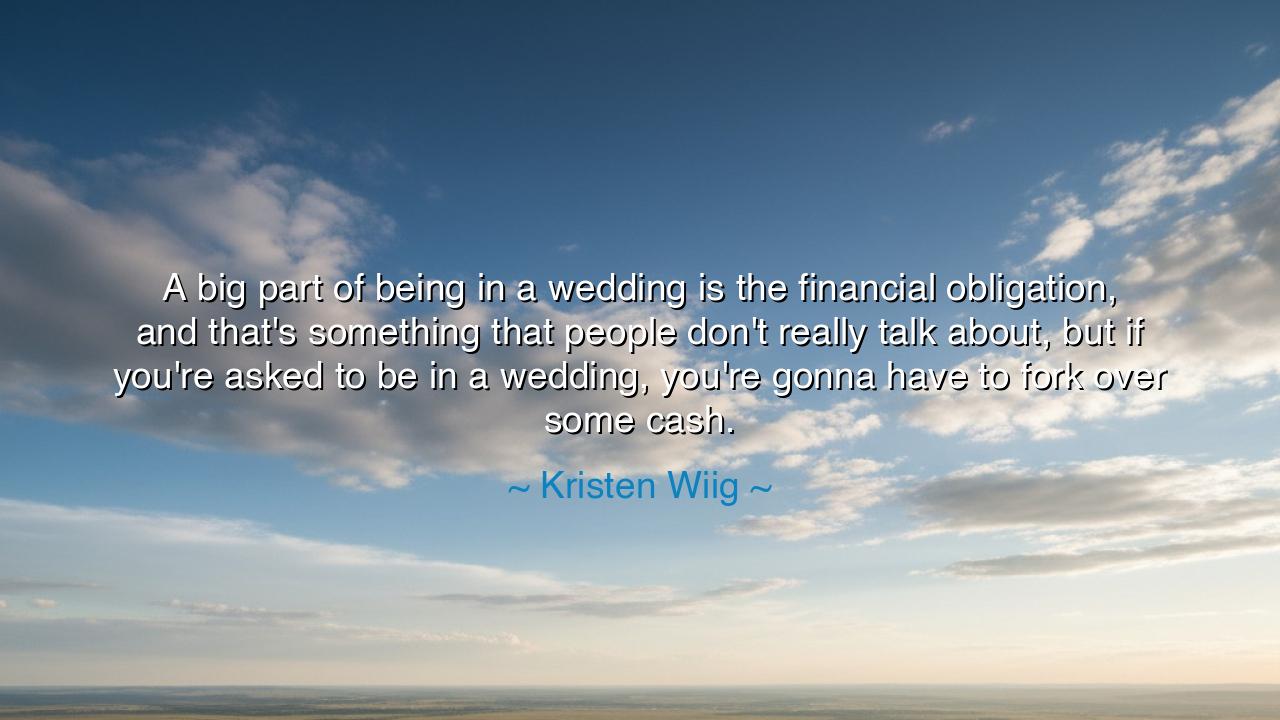
A big part of being in a wedding is the financial obligation
A big part of being in a wedding is the financial obligation, and that's something that people don't really talk about, but if you're asked to be in a wedding, you're gonna have to fork over some cash.






In the words of Kristen Wiig, we find a truth both practical and profound: “A big part of being in a wedding is the financial obligation, and that's something that people don't really talk about, but if you're asked to be in a wedding, you're gonna have to fork over some cash.” What seems at first a jest carries within it a lesson about the hidden burdens of celebration, and how love’s ceremonies often ask not only for presence, but for sacrifice. The wedding, though radiant in joy, calls upon both bride, groom, and guest to contribute not only with heart, but also with treasure.
The financial obligation is an unspoken duty, an invisible thread binding families and friends together in shared expense. Dresses, gifts, journeys, feasts—all become part of the offering laid upon the altar of matrimony. And while the world delights in the beauty of the day, few speak of the weight it places upon those who support it. Wiig reminds us that devotion is measured not only in affection, but in the willingness to give of one’s resources for the sake of another’s joy.
History shows us this truth in the marriage feasts of ancient Rome, where families of the bride and groom bore the cost of lavish banquets to honor not just their children but their community. To decline such generosity was to risk shame; to accept it was to endure hardship gladly, for the sake of reputation and love. Thus, even in antiquity, the bond of marriage was entwined with matters of coin as much as with vows.
Yet within this burden lies also the beauty of sacrifice. To spend for the sake of another’s happiness is not waste, but offering. When friends and family gather, adorned and prepared, bearing gifts and fulfilling duties, they declare by their actions that love is not the concern of two alone, but of all who surround them. The cost, though heavy, becomes a symbol of shared investment in the union’s success.
So let this teaching endure: do not despise the obligations of weddings, for they are part of the sacred work of community. But let those who plan such feasts also show mercy, remembering not to crush their loved ones beneath the weight of vanity. For generosity flows both ways—the couple receives the gifts of others, and in return must show gratitude, humility, and care. In this balance, the financial burden is transformed from suffering into a shared act of love, and the day becomes not only memorable, but meaningful.






Mmit
Kristen Wiig’s perspective on the financial side of weddings is both refreshing and true. The costs of being in a wedding can add up quickly, and it’s often something that’s glossed over. Do you think couples should consider the financial burden on their wedding party and guests more carefully when planning, or is it just part of the tradition that people are expected to accept?
HTHoai Thuong
Kristen Wiig is absolutely right about the financial obligations tied to being in a wedding. Many people don’t think about the costs of being in the bridal party—whether it’s for travel, attire, or gifts. It’s something that can cause a lot of stress for some people. Do you think wedding guests and participants are becoming more open about the financial challenges they face, or is it still a topic that gets avoided?
MHTran Minh Huy
Kristen Wiig’s quote about the financial aspect of weddings is so relatable. The amount of money spent when you're part of a wedding party is rarely discussed, but it can be a lot. Between the dress, travel, and the gift, it can quickly become an expensive affair. Do you think that the financial burden discourages people from participating in weddings, or is it just seen as part of the experience?
GCHau Game Channel
Kristen Wiig’s observation on the financial side of weddings is spot on. Weddings often feel like a celebration, but when you're involved, there's a hidden financial burden no one talks about. From buying dresses to giving gifts, it adds up quickly. Do you think it’s realistic to expect wedding guests or wedding party members to shoulder these costs, or should the couple bear more of the financial responsibility?
QHBui Quang Hung
Kristen Wiig’s comment about the hidden financial cost of being in a wedding really hit home. People don’t realize how much it costs to be in a wedding party—especially when you add up all the expenses like travel, gifts, and the attire. Do you think it’s fair to expect people to bear those costs, or should there be more transparency when people are asked to be in the wedding party?